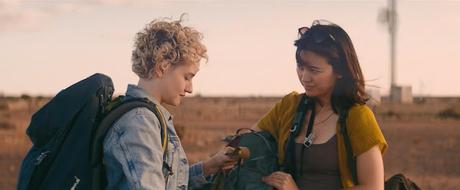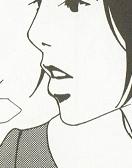
Kitty Green’s The Assistant threw Julia Garner’s character into a film production company in which a man, never fully seen, had free reign to abuse women, with the institutional support of the entire organisation. It was set up as an incredibly tense piece, in which more and more slightly off-kilter happenings added up to a horrible realisation. Jane was a witness, with very limited power to effectively intervene in a system set up to fail women. Green successfully accomplished two things: painting a terrible portrait of an institution through the eyes of someone coming in from the outside and situating herself within it, and showing the process of weighing information and an increasing sense of unease until it adds up to an inescapable conclusion.
Like The Assistant, The Royal Hotel is loosely based on real events. It takes inspiration from the 2016 documentary Hotel Coolgardie, in which two Finnish backpackers experience the horrors of working in a small Western Australian town pub. The camera observes as they face severe misogyny and xenophobia by a clientele outraged that they refuse to confirm to whatever expectations they have of two women working behind a bar. Having recently been robbed in Bali, just leaving isn’t really an option: they’re economically dependent on the job. In The Royal Hotel, Julia Garner’s Hanna and Jessica Henwick’s Liv end up in a rural pub when Liv runs out of money in Sydney. They’re American, pretending to be Canadian because people like Canada. An agency places them in a mining town in the middle of nowhere, with the ominous warning that they’ll have to cope with a lot of male attention there, a deeply disturbing moment early in the film that feels like the first of many red flags that pop up before the two even arrive at their destination. It doesn’t feel like the agency woman talking to them feels any responsibility for them – they’re foreigners, fed into a well-oiled machine, without the resources to make any other choice. They’ve likely never read the countless stories of overseas workers who have gone through horrible ordeals (stories of women who barely made it out alive, or haven’t). It’s also obvious from the start that there is a rift between Hanna and Liv already: Hanna is a lot more cautious and willing to cut their adventure short to go back, whereas Liv is open to continue on wherever it takes them. Liv is the one without money, and the friendship between them is why Hanna goes along with it.
If Hanna goes into it with a sense of unease, each consecutive moment in the film pushes her further towards the realisation that this was an error. They have to take a train, a bus, a car to the pub – making it clear how difficult it would be to leave if they have to. There’s nothing else there – the old Royal Hotel stands like a leftover of a forgotten time, and without cars, they’re trapped there. A promised pool turns out to be an unfilled bowl of concrete. They also learn quickly that this is a very different Australia than the one they’ve previously experienced as tourists (in the first scene we see them on a party boat in Sydney Harbour, surrounded by other tourists – they appear to not have traveled far or long enough to have realised that ordering a Foster’s at the bar is a cultural faux pas). Hugo Weaving’s publican Billy greets Hanna’s thinly veiled disgust at his question of whether they speak English by calling her a “smart cunt”, which he may have meant as a compliment (the punters at the bar certainly don’t mean it as such when they add “sour” to it), but just raises Hanna’s sense of unease even more. It’s an interesting decision by Green to focus on two Americans, who come into the experience with a certain expectation of at least having a fluency in English, only to discover that it doesn’t get them very far through the cultural divide, which takes an entirely different kind of deciphering (there’s a whole scene that implies that there is also an undercurrent of anti-black racism at play, when an Aboriginal delivery driver hesitates to come in for a drink – a moment that remains undecipherable for Hanna).
A lot of reviews of the film have compared it to the 1971 Ted Kotcheff film Wake in Fright, in which a school teacher is stranded in an outback town and journeys into the darkness of violence and drinking culture – but The Royal Hotel adds the element of gender to it, and the specific kind of threat that women face in that environment. From the first night of service, they experience the kind of low-key jokey sexism that is always a thin veil for an abyss of violence beneath, especially in a place so devoid of other women, and of anyone who should speak up for them (the full extent of Billy’s support is to tell Hanna to smile more, to bring in more customers). The miners have clearly run other overseas travel visa workers through the paces before (the implication is that they are always female), and Liv and Hanna are walking right into an established power structure that they don’t understand yet. Liv remains open and willing to give everyone the benefit of the doubt, often resorting to the argument of “cultural differences” whenever Hanna brings up a moment where she felt severely unsafe. Hanna is tasked with the impossibility of weighing her own sense of possible danger against the demands of her friendship, and the increasingly difficult task of keeping Liv, especially when she drinks to excess, safe. It’s an interesting choice to know so little about either of the them – all that the film gives us is Hanna’s hesitance about alcohol, because of her mother’s drinking, and Liv’s statement that they’ve both tried to get as far away as possible from something back home. The crowds at the pub don’t really care about who they are beyond their willingness to play along with the rules they’ve set, and the one thing that sets them apart is Hanna’s unwillingness to confirm to their expectations.
Billy is technically their boss, and he should be responsible for their safety, but his drinking, only slightly curtailed by his constantly exasperated partner Carol (Ursula Yovich), and the hotel’s debts (which add to the sense of unsafety – what if there’s no money at the end of the ordeal?) make him entirely ineffectual. The three men that stand out among the pub’s clientele seem to vie for the girls in their own way – Matty (Toby Wallace) makes himself seem relatively harmless when he takes the girls out to a swimming hole and keeps them company, but he has ulterior motives, and it becomes clear that his help is conditional when Hanna rebukes him. Teeth (James Frecheville) seems harmless enough, a guy who has his drinks at the bar and a constant eye on Liv, but seems willing to at least share some vital information about the situation they’ve found themselves in. The most obviously dangerous is Dolly (Daniel Henshall), who teeters on the edge of violence throughout, which occasionally erupts into thrown chairs and threatening and mocking other customers. It becomes increasingly hard for Hanna to walk the line between being just accommodating enough to avoid escalation and to stand up for both of them to draw boundaries. The situation gets out of control when Billy goes to hospital, and Carol indicates that neither of them will be back: she tells the Liv and Hanna to run the bar by themselves for another week and then take whatever money is owed from the profit. Hanna calls a Norwegian she met in Sydney to pick them up and take them away, but he has clearly had a radically different experience of Australia than them – whatever illusion of safety he gives off as an outsider fades almost immediately. A night escalates, Hanna receives an incredibly unsettling phone call from one of the women who worked in the pub previously, trying to make sense of a statement that could indicate a harmless check-in or a message that one of them has disappeared after Dolly drove her to the bus stop (the film leaves it vague – it’s up to the viewers to decide the story, the true extent of the horror). Then she narrowly rescues Liv from being driven away in a car, avoiding what is clearly implied to be an intended rape. The film turns at this point – all the implied danger from the gender imbalance, the violent and sexual comments, the sense of isolation in a crowd of drunken men, end in Hanna grabbing an axe to ensure Liv’s safety. There’s no going back at that point, and whatever has been brewing beneath the surface is now fully in view. Matty, who reveals himself as just another monster under the veneer of friendship, tries to break into the hotel along with Dolly, so that they can both claim their prize. Hanna is injured in the struggle, and Liv only realises that Hanna has been correct in all her warnings when she sees the blood on her face. Teeth stops Dolly and Matty, but not out of the goodness of his heart, but because he sees an earlier claim he’s made on Liv as thwarted by the two men. No one is a safe person to trust.
The Royal Hotel has all the markings of a horror film. The Royal Hotel itself, for two women without a car in a place where the bus only goes twice a week, might as well be an inescapable locked room with monsters at the door. The miners have created their own little ecosystem of rules that female workers are thrown into like prizes to be claimed. Hanna burns all that shit down in the end – using all the booze that fed the violence as fuel – so at least nobody else will be fed to the machine.
2023, directed by Kitty Green, starring Julia Garner, Jessica Henwick, Ursula Yovich, Hugo Weaving, James Frecheville, Toby Wallace, Daniel Henshall.

